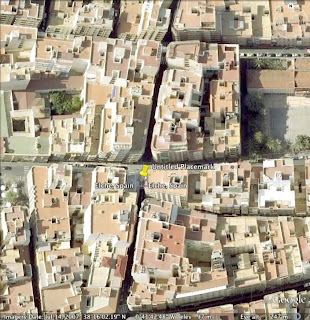New Worlds/New Identities
In the cases of the “Les Olympiades” in Paris, France and the shoe industry in Elche, Spain, the inhabitants are drawn together for a certain purpose. In Paris, the “Les Olympiades” were built as residential complexes to home the middle class. Today, South-Asians have, over the years completely revitalized the buildings and turned it into a fully functioning city run by the people themselves. Dubalin explains, “All of this did not arise from a single organization, but rather the coinciding action of a series of self-motivated minorities.” The inhabitants (largely consisting of Chinese, Vietnamese, Korean and north African) are completely dependent on themselves. They have radically changed the appearance of the buildings, using them for storage facilities, places of worship, warehouses, parking lots and above all else restaurant trade and the food market. These buildings now represent the mutation and assimilation of new populations within the city.
The people of Elche Spain are in a similar position where more than 25% of the inhabitants work in the shoe industry. However, because of the massive growth of the industry, people now work mainly from home. The city works together, sending bits and pieces of the shoes to certain areas to be worked on, then sent elsewhere to be finished. This domestic work has also changed the identities of the inhabitants. Because the workforce is consisted of mainly women, this changes the “traditional” role of the housewife who is also responsible for child bearing cooking and cleaning. However, many women see this as an amazing opportunity. This domestic work environment has also changed the urban setting of the city as a whole. People are not going out as much and one can hear the noise of the sewing machines. White vans can be seen all around the city, transporting the shoes from one house to the next.
In Paris, the members of “Les Olympiades” discuss how important it is to have friends. Wang Shixiong says, “It is important to have friends because then everyone knows each other.” It is easy for people to negotiate because they have relatively same backgrounds and understand each other. The benefits of “Les Olympiades”, according to Shixiong, are that you have everything you need there. There is no reason for you to leave the city. You can find everything. However, a disadvantage is that you never do leave. You live your whole life in this small city, and never see the world.
In Elche, women have become the predominant workers. Many women talk of how they would raise their children AS they worked in their homes. Though the wages are minimal, women see as an opportunity to use as their free time. Women now make money, take care of their children, cook, clean and are responsible for the house.
The inhabitants of “Les Olympiades” have completely changed the physical landscape of the buildings. After the rejection of the buildings, many Southeastern Asians began to inhabit them. These buildings are now called a “City in a building” because that’s what it is. The inhabitants have used every part of these buildings for something. In the tower blocks there are restaurants, temples, and workshops. Many are still used today. The lower levels are used for warehouses, refrigerated storage facilities and parking garages for [delivery] vans. It is called a
“City in a building” because one can find anything they need there.
In Elche, the city has become riddled with focal points where people make certain parts of the shoe. Because no one works in factories, all of the work is done at home. Therefore, certain parts of the shoe are taken to different parts of the city to be manufactured or made. As multiplicity says, “they [the inhabitants] are connected by a grid of hundreds of white vans that transport finished and unfinished products.” An argument can be made that the entire city of Elche has turned into one giant factory.
Works Cited
Dubalin, Y. et. al. "A City in a Building: Paris Subversions." USE: Uncertain States of Europe. Ed. Susan Wise. Milan: Skira Editore S.p.a., 2003. 80-87.
Multiplicity. "House Factories: Elche Disseminations." USE: Uncertain States of Europe. Ed. Susan Wise. Milan: Skira Editore S.p.a., 2003. 150-157.










